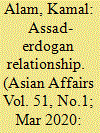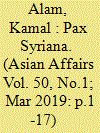| Srl | Item |
| 1 |
ID:
171873


|
|
|
|
|
| Summary/Abstract |
Much has been made of the once brotherly relationship between Syrian President Bashar al Assad and the Turkish President Recep Teyep Erdogan. Indeed, this relationship formed the bedrock of Turkey's much-vaunted move towards the Arab world and its re-engagement with regions on which Ataturk and his successive Kemalist Generals had shut a door. Yet, more than fifteen years after the historic first visits by the Turkish and Syrian leaders to each other's capitals, the Syria-Turkey relationship lies in ruins. Whilst much of the focus of the war in Syria has been on the exaggerated sectarian divide in the Middle East and the great power rivalry between the United States and Russia, a key aspect overlooked is the fundamental relationship between Turkey and Syria. The last two decades of this relationship have been defined by Assad and Erdogan. As Turkey slowly begins to re-engage with Syria one can trace the tumultuous relationship between the two neighbours in the immediate aftermath of the dissolution of the Ottoman Empire. The Arab nationalists and Turkish nationalists have been at daggers drawn over the make up of the border. Syria has never forgotten the land-grab of the Turks in the aftermath of the French exit of the Levant. Furthermore, the diverse set of communities – the Greeks, the Armenians, the Kurds and the Syriacs – that make up the inhabitants of the region still suffer from the effects of the mismanagement of the French exit and what is seen by many of these communities as an illegal annexation by Turks and Arabs. However, under the Syrian Arab Republic the Christians of all denominations including the Armenians and Greeks flourished whilst Turkey forced only one identity upon its once diverse people. This article will argue that the relationship between Syria and Turkey has ebbed and flowed – and this dynamic is rooted in history where successive Turkic dynasties have favoured Syria as their pivot to control the region. Similarly, when Syria became less important, the very foundation of the Turkic and later Turkish influence became weak in the region. The close relationship between Erdogan and Assad overturned more than six decades of animosity, but once Erdogan turned his back to Assad and supported the overthrow of the Syrian government the relationship fell apart. As the end of the war nears, a defining factor to end this war will be how Turkey and Syria reconcile or interact. The Syrian Kurds now seem to be back in Assad's corner as they prefer to be under Damascus' sovereignty then under attack from Ankara across the border. The Kurdish question is of significant value to both Syria and Turkey; it has been a major reason for both countries to be at peace and war. A closer look at the history of these two countries' relationship proves that the Assad-Erdogan relationship has mirrored the history of the two states since the fall of the Ottoman Empire. Their future in more than one way is now inter-twined on how they interact with each other.
|
|
|
|
|
|
|
|
|
|
|
|
|
|
|
|
| 2 |
ID:
165215


|
|
|
|
|
| Summary/Abstract |
The staying power of Bashar al Assad and the ability of his state to outplay their regional and international enemies have come as a surprise to many. Rather than just the Russians and Iranians being responsible for this there was a coherent strategy to win back not just the territory but also the alliances that it temporarily lost during the course of this war. And unlike Saddam after the first gulf war, Bashar al Assad is already remerging fast as a regional player again. Veteran diplomats such as Henry Kissinger and Zbigniew Brzezinski had cautioned against a fight against Assad, so had seasoned academics such as David Lesch and Patrick Seale. Whilst many experts had predicted the fall of Assad within weeks in 2011 a careful reading of the Lebanese war and Syrian regional policy would act as the best guide to answer how Assad has managed to stay in power despite all the odds. A combination of his father's legacy and regional alliances has helped him a great deal. The ethnic and sectarian fault lines of Lebanon, Iraq, Turkey and Palestine have all contributed to his success including receiving support from virtually all stake holders of relevant neighbours such as the Shia and Christian of Lebanon, the Palestinian factions, the Alevi and Arabs of Turkey, the Sunni or Iraq. An ability to divide his opponents both on the battlefield and diplomatic table was the main factor that turned the tide in favour of Assad along with the obvious military support from Russia and Iran, but also by key Arab states such as Egypt and Algeria.
|
|
|
|
|
|
|
|
|
|
|
|
|
|
|
|